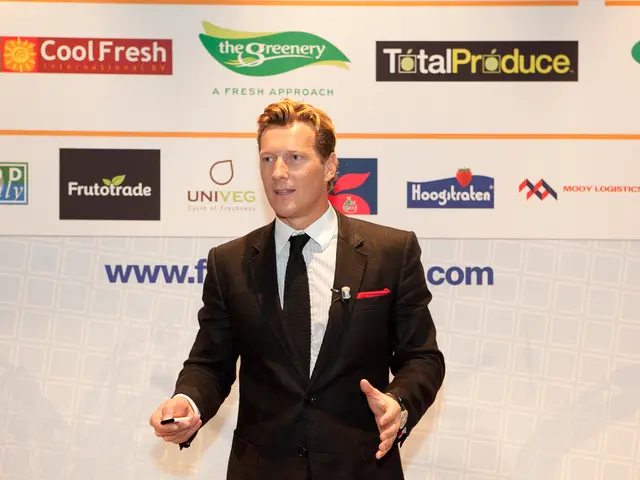A Gritty, Uncensored Chat with Erik Visser, CEO of Hamlet Protein
CEO Erik Visser of Hamlet Protein Discusses Leadership, Sustainability, and Global Expansion Plans
This in-your-face interview with the big cheese of Hamlet Protein gives you the lowdown on his no-nonsense leadership style, the company's eco-friendly innovations, and its strategies for global domination. With over two decades in the agro business, Erik Visser lays it all out, stressing on the importance of team empowerment, adaptability, and leveraging the "multiplier effect" to speed up progress. The conversation centers on Hamlet Protein's focus on creating earth-friendly, top-notch soy-based protein solutions for young animal nutrition and addressing global market demands. It also delves into opportunities in emerging markets and dishes out hard-earned advice for aspiring leaders navigating rapidly evolving industries.
The Background and Vision
I'm Erik Visser - agribusiness bigwig with over two decades under my belt. I've held some high-profile positions across multiple geographies and sectors within the animal nutrition and feed industry. I'm currently the CEO of Hamlet Protein. We're a leading global company specializing in soy-based protein solutions for young animal nutrition. Our stuff is designed to cater to the specific needs of young critters like piglets, calves, and chicks, promoting healthy growth and reducing the antibiotic need. With facilities in Denmark and the U.S., we cater to customers worldwide, offering innovative solutions that not only support animal health but also address environmental sustainability. Hamlet Protein's mission hinges on crafting high-quality, highly digestible feed solutions that contribute to healthier animals, efficient production, and less environmental impact. This aligns with my personal vision of balancing business growth with responsibility towards the planet and the communities we serve.
Leadership Style
For me, leadership boils down to setting the tone and creating an environment where people feel inspired to perform at their best. Being a "player-coach" means being active when necessary, while giving the team autonomy to own their responsibilities. I achieve this balance through three core principles:
- Clarity of Vision: I ensure the team understands our strategic goals and how their roles contribute to our success. Clarity lets them take ownership confidently.
- Empowerment: I trust my team to make decisions and encourage them to experiment and learn. I step in only when they need guidance or when critical decisions require my involvement.
- Active Participation: While I delegate effectively, I stay accessible and informed, so I can provide support, remove roadblocks, or lead by example during rough patches.
Ultimately, I believe an empowering leader leads to better outcomes, and it's my role to nurture their potential while keeping us aligned on our goals.
Turning Challenges into Opportunities
One of my favorite tales of adversity came early in my Hamlet Protein days. We were attempting to land a partnership with a key customer in a new market, but our initial proposal was nixed due to pricing concerns and doubts about our product's competitive advantage. Rather than packing up and moving on, we used that rejection as a learning opportunity. By diving into deeper conversations with the customer, we adjusted our pricing structure, boosted our product value proposition, clarified ROI, and customized our approach to suit their specific market dynamics. Eventually, we turned the "no" into a "yes," snagging an enduring partnership that not only opened the market for us but also formed the foundation for how we approach similar challenges. This experience solidified my belief that a "no" is usually an invitation to refine and innovate, not the end of the story.
The Multiplier Effect in Action
The multiplier effect is basically clearing roadblocks in business operations to speed things up. By focusing on decisions or tasks that help the team carry on with their work, you accelerate organizational forward motion. Sometimes, these decisions are simple - answering an email, for example. Other times, they're complex or time-consuming - hiring staff, setting budgets, developing strategy, visiting clients. By using the multiplier effect to guide our decision-making process, we've reduced bottlenecks, boosted productivity, and mapped out the path for future success.
Sustainability Initiatives
Sustainability is a core pillar of Hamlet Protein's game plan. We handle environmental challenges through innovation, efficiency, and collaboration. Our soy-based protein products promote efficiency in animal nutrition by being highly digestible, which not only fosters healthier animals but also buries the environmental impact of farming. We've optimized our production processes to lower energy and water consumption and minimize emissions. We channel excess heat from our production in Denmark to warm more than 3,000 homes in our community. Striking this balance between sustainability and economic demands requires educating our customers about the long-term benefits of sustainability, not just for the planet but for their wallets, too. By investing continuously in research and development, we ensure our solutions stay competitive while meeting the pressing need for eco-consciousness in global markets.
Opportunities & Threats in Emerging Markets
Emerging markets like South America and Asia offer enormous potential due to their ballooning populations and increasing demand for animal protein. However, they also pose unique challenges.
Opportunities:
- Rising Protein Consumption: The expanding middle class in these regions is fueling demand for meat and dairy products, creating a buffet of opportunities.
- Focus on Efficiency: Producers in these markets are on the lookout for ways to level up production and cut costs, which aligns beautifully with our expertise in efficient, sustainable feed solutions.
- Technological Adoption: Increasing openness to technology adoption in farming practices offers a tantalizing opportunity to introduce innovative feed products and solutions.
Threats:
- Regulatory Complications: Navigating diverse regulations across countries can get damn complicated when you're trying to expand.
- Infrastructure Gaps: Limited logistics and storage infrastructure in some areas can pose headaches in distribution.
- Economic Volatility: Currency fluctuations and market instability can impact pricing and demand in a heartbeat.
To construct a killer strategy, it's crucial to share knowledge. With our technical insights into animal rearing and nutrition, and supported by local resources, we can help producers in emerging markets raise their productivity. By grasping the complexities of all market dynamics, we tailor our strategies to capitalize on opportunities while minimizing risks.
Global Expansion with a Personal Touch
Expanding Hamlet Protein's global reach while maintaining that special touch requires a careful mix of strategic scaling and localized engagement. We concentrate on tailoring our solutions to fit the specific requirements of different markets. Our production facilities in Denmark and the US let us serve diverse regional needs effectively while maintaining the highest quality standards.
Maintaining rock-solid relationships with our customers is paramount. We prioritize direct communication, regular feedback loops, and custom support services to keep the connection alive. Additionally, leveraging digital tools ensures we stay agile and responsive as we expand, guaranteeing each customer feels appreciated despite our expanding footprint. By combining global scalability with a local focus, we grow sustainably while forging lasting relationships with stakeholders.
Advice for Aspiring Leaders
My advice to young guns is to embrace change like a Golden Retriever fetches a frisbee. Industries like animal feed are evolving rapidly due to advances in technology, shifting consumer demands, and the growing significance of sustainability. To excel, it's vital to stay curious and committed to lifelong learning. Build a rock-solid foundation of knowledge, but don't be afraid to explore new ideas and approaches.
Leadership, you'll find, isn't just about strategy - it's as much about people as it is about plans. Invest time in building relationships and empowering those around you. Success isn't usually a solo act, so prioritize collaboration and communication. Resilience is key - view challenges as opportunities for growth, not obstacles to be feared. And above all, remain passionate about what you do. When you are genuinely fixated on your work, it not only fuels your success but also inspires others to follow your lead.
- Climate change has been a hot topic in science and environmental science, highlighting the need for sustainable living.
- Retail, one of the key business sectors, has been heavily impacted by online shopping and shifting consumer behavior.
- Entrepreneurship is gaining traction in the fashion-and-beauty industry, with more and more independent brands emerging.
- The automotive industry is increasingly focusing on transitioning to electric vehicles to reduce carbon emissions.
- The finance industry is always on the lookout for new investment opportunities, with venture capital playing a crucial role in this space.
- The dynamic landscape of personal-finance requires continuous education and self-development for individuals to effectively manage their wealth-management.
- In the field of home-and-garden, automation and smart technology are transforming how people maintain their homes and engage in home-improvement.
- Baking and beverages have seen a surge in popularity, thanks to social media influencers and the rise of home bakers.
- The interior-design world is embracing eco-friendly materials and sustainable practices to promote outdoor-living and foster a deeper connection with nature.
- The food-and-drink scene is thriving, with an increased focus on healthy cooking and global cuisines.
- Dining experiences are becoming more immersive, with a growing emphasis on mindfulness and relationship-building.
- Family-dynamics have evolved, with more emphasis on open communication and emotional intelligence.
- Technology has revolutionized the retail sector, offering personalized shopping experiences through product reviews and recommender systems.
- Productivity tools and apps are helping individuals juggle multiple responsibilities and tackle goal-setting in their day-to-day lives.
- Cybersecurity is increasingly critical in the banking-and-insurance sector, with the rise of fintech and online transactions.
- Real-estate markets are influenced by factors such as economic conditions, interest rates, and location trends.
- The stock market can be volatile, and investors need to stay informed about financial news, market trends, and influential companies.
- Private-equity firms are playing a significant role in shaping industries through strategic investments and buyouts.
- Data-and-cloud computing have transformed businesses, enabling them to store, analyze, and leverage large amounts of data for better decision-making.
- The aerospace industry is exploring new frontiers in space exploration and satellite technology, with a boost from artificial intelligence.
- Energy is a hot commodity, with a renewed focus on sustainable sources like wind and solar power.
- Environmental-science researchers are working diligently to mitigate the effects of climate change through carbon capture solutions and technological innovations.
- The manufacturing industry is adapting to Industry 4.0, incorporating automation, IoT, and data-driven decision-making.
- Business leaders are leaning into leadership styles that foster collaboration, empowerment, and adaptability.
- The industry of education-and-self-development is booming, with online courses and interactive learning platforms gaining popularity.
- Personal-growth aspirants are increasingly focusing on mindfulness practices, self-awareness, and emotional intelligence.
- Pets are being treated as family members, with the pet industry experiencing rapid growth in terms of products and services.
- Deals-and-discounts are a major driver of consumer behavior, with retailers offering promotions to attract customers.
- The relationship between technology and health continues to evolve, with advancements in areas like wearable devices and telemedicine.
- Love-and-dating is constantly adapting to new trends and technologies, with online dating platforms and virtual experiences becoming increasingly popular.








